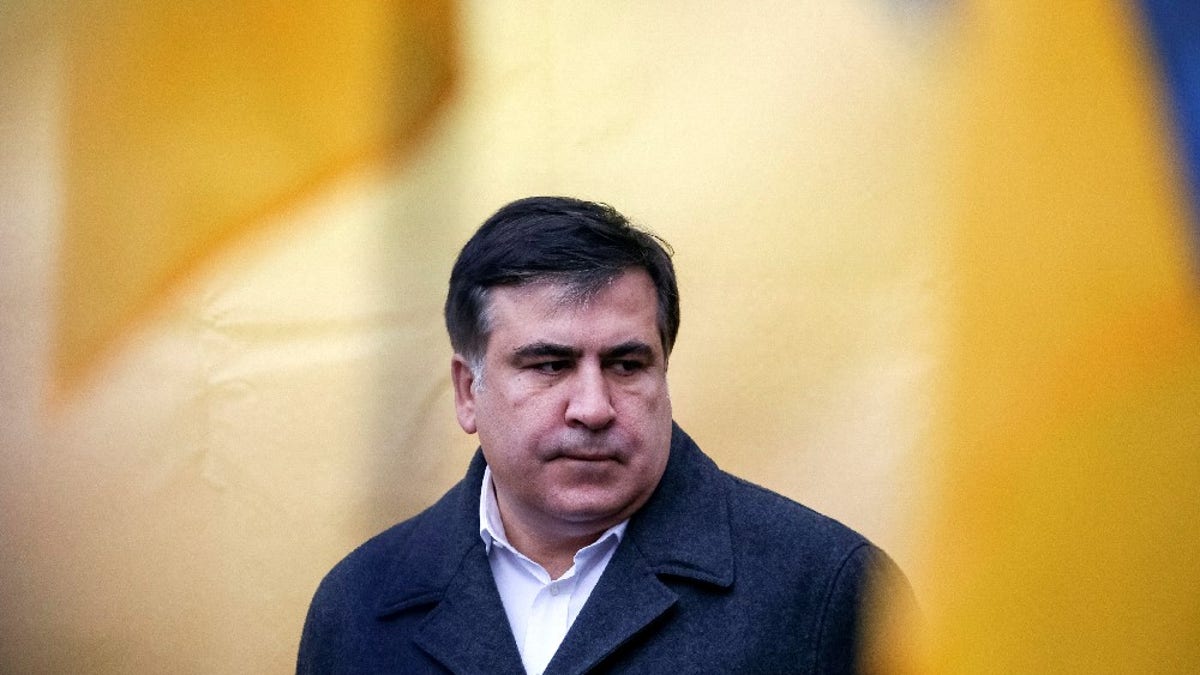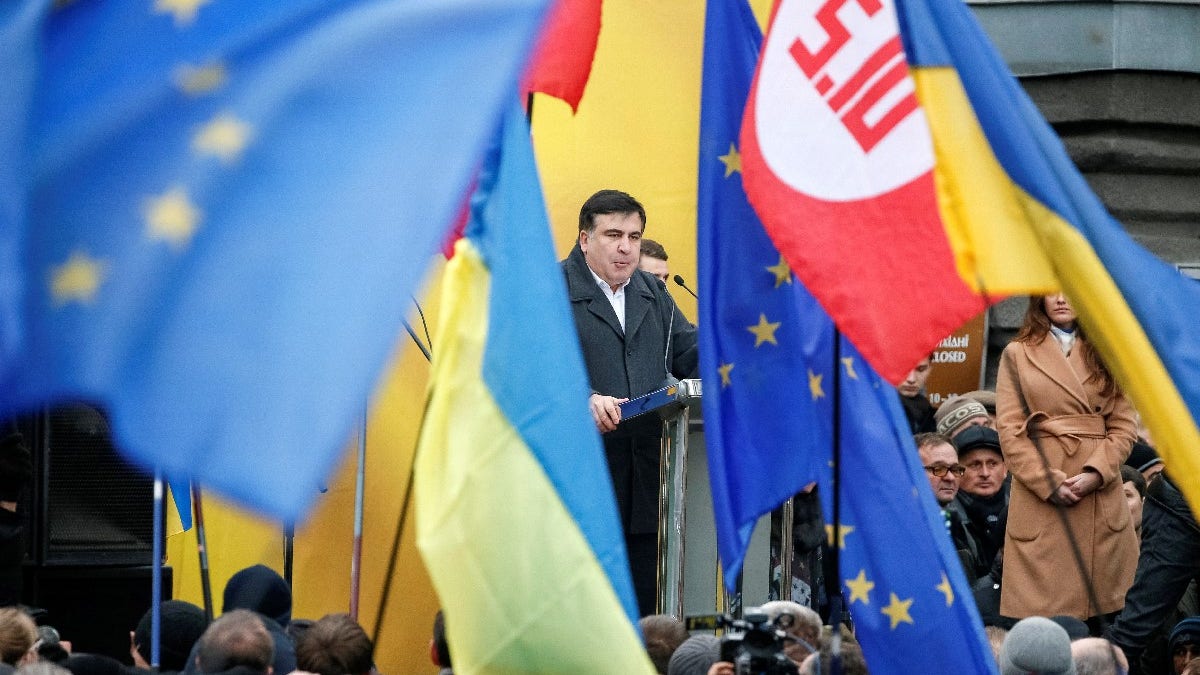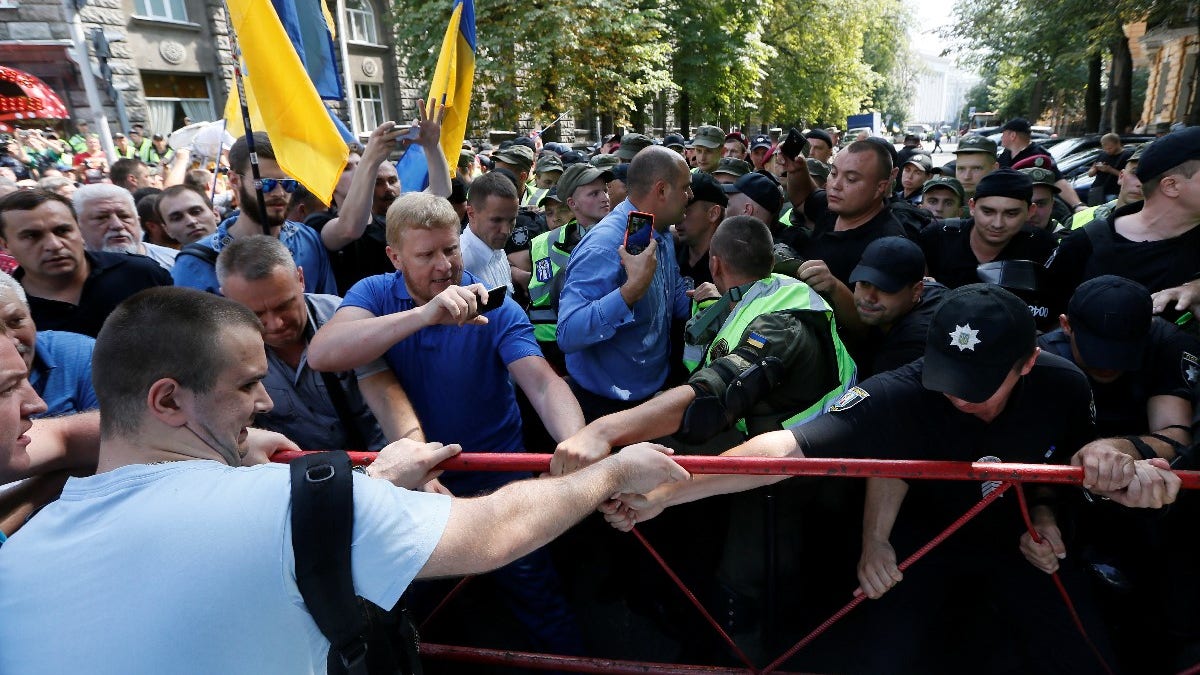
FILE -- Former Georgian President and former governor of Odessa region Mikheil Saakashvili attends anti-government and in support of him rally in central Kiev, Ukraine, November 27, 2016. (REUTERS/Gleb Garanich)
When Mikheil Saakashvili was voted out of office as president of Georgia in 2012, he had no place to go. His political opponents were now in power, and they sought to settle scores. Saakashvili's friend from their student together - Ukrainian President Petro Poroshenko - offered a lifeline. He not only granted his friend Ukrainian citizenship, he made him governor of Ukraine's Odessa region, appreciative of Saakashvili's record of reforms in Georgia and his administrative gusto.
But Saakashvili repaid Poroshenko's kindness by resigning from the post in 2016 and launching a wave of reckless and unsubstantiated corruption charges against Poroshenko and the government.
Then, last week, the Ukrainian Migration Service announced that Saakashvili failed to inform the agency that he was facing criminal charges in Georgia when he applied for Ukrainian citizenship. The government can annul citizenship if an individual acquires citizenship in another country or submits false documents, which Saakashvili did.

So Ukraine stripped Saakashvili of his Ukrainian citizenship.
In response, Saakashvili has lashed out, trying to hit Poroshenko where he thinks it will hurt the most: He said President Donald Trump's spurious allegations about Ukrainian meddling in the 2016 U.S. presidential election are true.
Saakashvili went even further, alleging unspecified “foul play initiated by some Ukrainian oligarchic circles.” This is especially hypocritical coming from Saakashvili. His closest associate is turncoat Ukrainian politician Serhii Leshchenko, a former Poroshenko ally who became a vocal critic of the president. Leshchenko was also involved in the scandal surrounding former Trump campaign manager Paul Manafort’s lobbying work for former Ukrainian President Viktor Yanukovych.
Further, Saakashvili's indignation at losing his Ukrainian citizenship rings hollow. When he was president of Georgia, Saakashvili tried to strip the citizenship of political rival Bidzina Ivanishvili, a move that was later overturned by the Georgian Supreme Court.

If the annulment of Saakashvili's citizenship is baseless, as he says, why was the decision confirmed by the National Anti-Corruption Bureau of Ukraine (NABU), the investigative body set up to root out corruption at all levels of Ukrainian society? It's worth noting that the NABU is headed by Artem Sytnyk and employs Gizo Uglava - two strong Saakashvili allies. Is Saakashvili saying his close associates are puppets of the alleged "oligarchic foul play?" His allegations make no sense.
Saakashvili's brief turn as governor of Odessa was long on PR and short on performance. He made a great initial show of immersing himself into his region, but eventually began spending much more time in Kiev, and on television talk shows, working to raise his national profile and setting his sights on Prime Minister Arseniy Yatseniuk.
Known as a reformer in Georgia, he seemed well-suited to rooting out Odessa's endemic corruption. But, again, it was more show than substance. At a high-profile Odessa forum in December, Saakashvili claimed to have unearthed a corruption scandal totaling $5 billion per year, grabbing headlines, as he intended.
He said that the Ukrainian state railway accounted for 40 percent of the $5 billion figure. But Saakashvili arrived at that figure without an audit or detailed analysis. It was quickly refuted by the nation's minister of infrastructure, noted corruption-fighter Andriy Pivovarsky, who showed routine audits of the railway and close cooperation with the European Investment Bank. Saakashvili's blustery and baseless attacks on Ukraine's government continued. He said the nation's Cabinet of Ministers is at “the apex of corruption.”
Saakashvili's time as president of Georgia deserves praise for tackling corrupting and jump-starting the economy. But it came at a price - diminished democracy. He amended the constitution to accrue more power. He suppressed protests. He restricted the press.
Saakashvili may think that his statements are exacting revenge on Poroshenko, but in truth he is taking revenge on Ukraine, the country he claims to love. He also might think that such claims will win Trump’s favor. In fact, such egocentric grandstanding may threaten U.S. support for Ukraine.
Saakashvili has said that Ukraine must “pay a price” for its “leaders’ incompetence and behind-the-scenes games.” But he knows as well as anyone that such a price - the direct result of his attacks and allegations -- will not be paid by his enemies, such as Poroshenko, Leshchenko and Sytnyk. The price would be paid by ordinary Ukrainians who defend their country and need the support of the U.S. and Europe in fighting Russia's ceaseless aggression against Ukraine.
But this is Saakashvili's preferred method of politicking. As Foreign Policy wrote: “Most worrying is Saakashvili's eagerness to go after his political opponents primarily by accusing them of criminal activity rather than by challenging their ideas through normal democratic politics.”
Ukraine stripped Saakashvili of his citizenship because he failed to disclose pending charges of corruption filed against him by the government of Georgia. But, during his short time as a Ukrainian citizen, he did nothing to show he was putting his new country above himself and his own towering ambitions.
Saakashvili has every right to be angry that Ukraine has stripped him of his citizenship. He has a right to fight in the courts and the media to regain citizenship in the country he professes to love. But if he does indeed care for Ukraine, he will not go on trying to inflict harm on the nation, as he has.
